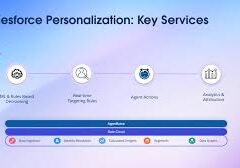Salesforce has evolved beyond its CRM origins, offering a plethora of functionalities. However, managing projects directly within Salesforce presents challenges as it lacks full project management capabilities. Yet, there are three viable options:
Option 1: Basic Project Management Features in Salesforce
For small teams with modest needs, leveraging built-in Salesforce features alongside platform customization may suffice initially. While these features—such as Salesforce Tasks, Chatter, Reports, Dashboards, and Process Builder—offer basic functionality, they may fall short for most teams as projects grow in complexity.
Option 2: Project Management Apps External to Salesforce
As project needs expand, integrating well-known external project management tools like Microsoft Project, Asana, Monday.com, or Smartsheet becomes a common choice. However, such integration necessitates customizations, often involving Salesforce admins and external consultants, increasing implementation costs and posing data security challenges. Additionally, limitations like limited data sharing, delayed data access, and potential integration disruptions during Salesforce updates may arise.
Option 3: Salesforce-native Project Management Apps on AppExchange
Opting for PM apps built specifically for Salesforce and available on AppExchange offers a seamless alternative. Leading examples include Inspire Planner, TaskRay, Mission Control, and Milestones PM+. These native apps offer several advantages:
Integration: Built using Salesforce technology, native apps seamlessly integrate with standard and custom Salesforce objects, eliminating the need for additional integration efforts.
Flexibility: Native apps allow extensive customization, enabling users to tailor them to specific needs by adding custom objects, fields, workflow rules, and more. Integration with other AppExchange apps further expands functionality.
360-degree View of Customer: Associating projects with other Salesforce objects provides real-time visibility into customer activities, facilitating comprehensive reporting and analysis.
Security: Native apps inherit Salesforce’s robust security infrastructure, ensuring data security and compliance with existing security settings and sharing rules.
Real-time Reporting: Synced data enables real-time reporting and analytics, offering insights into key trends and bottlenecks.
Automation: Native apps leverage Salesforce’s Process Builder for powerful automation, enabling automated project launches, task assignments, and role-based task allocations based on predefined templates.
Organizations have three main options for project management with Salesforce. While built-in features cater to basic needs, external project management tools require integration efforts and may encounter limitations. On the other hand, Salesforce-native project management apps from AppExchange offer seamless integration, flexibility, and enhanced functionality. Ultimately, the choice depends on your organization’s needs and priorities.
For assistance developing your Salesforce org for better project management, contact Tectonic today.













